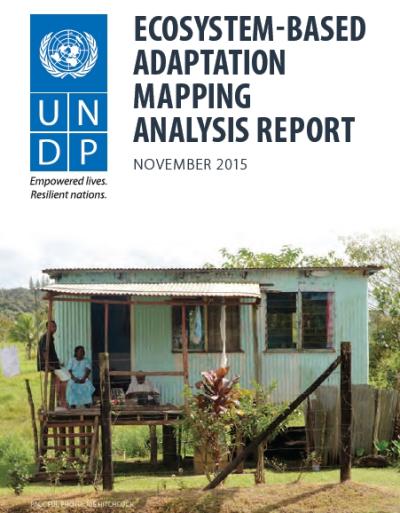
The United Nations Development Programme provides support to countries to adapt to climate change in the context of the 2030 Agenda for Sustainable Development, seeking to promote pro-poor and pro-growth adaptation which encourages climate-resilient economic development and sustainable livelihoods in the face of climate change.
UNDP-supported projects and programmes at the country level are organized around six Signature Programmes: Supporting Integrated Climate Change Strategies; Advancing Cross-sectoral Climate Resilient Livelihoods; Fostering Resilience for Food Security; Climate Resilient Integrated Water Resource and Coastal Management; Promoting Climate Resilient Infrastructure and Energy; and Ecosystem-based Adaptation (EbA).
This publication puts the spotlight on UNDP’s EbA Signature Programme. It explores and unpacks ecosystem-based solutions to climate risk management, including dealing with climate variability and uncertainty.
In order to provide a working definition of EbA for this particular Signature Programme, and to inform planning and implementation of CCA projects in future, this mapping analysis was undertaken through applying a series of technical tools (database queries, document reviews), coupled with consultations with stakeholders and experts; methodological descriptions are given on pages 6-10 of this report. Given that capacity development lies at the heart of UNDP’s approach to climate change, it is hoped that bolstering institutional knowledge of EbA within UNDP – and sharing these lessons learned with interested parties – will serve to increase our ability to address climate change risks globally.
UNDP’s EbA programme is aligned with its Ecosystems and Biodiversity (EBD) programme portfolio, through which UNDP is committed to building the capacities of developing countries and economies in transition to manage natural ecosystems in line with their own development priorities and needs.
Two key approaches underpin UNDP’s EBD work:
- Developing capacity at the individual, institutional and systemic levels to identify and implement new options for effective democratic governance for biodiversity and ecosystem management; and
- Assisting countries to identify, access, combine and sequence environmental finance for biodiversity and ecosystem management, mobilize pro-poor markets for ecosystem goods and services, and generate sustainable livelihoods.
Within this work, EbA approaches can help vulnerable communities increase their capacity to adapt to the impacts of climate change, and build the resilience of the ecosystems on which their livelihoods and welfare depend. EbA approaches can also generate significant social, cultural and economic benefits. An EbA approach typically forms part of an overall national or regional adaptation strategy, and involves the sustainable management, conservation and restoration of ecosystems to provide services that help people adapt to anticipated impacts of climate change.
